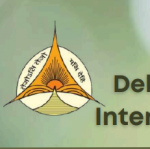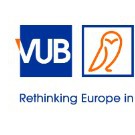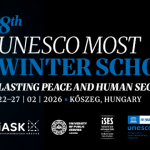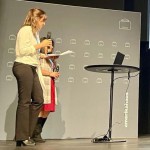Smart world! Smart Europe? Conference on European Digital Sovereignty
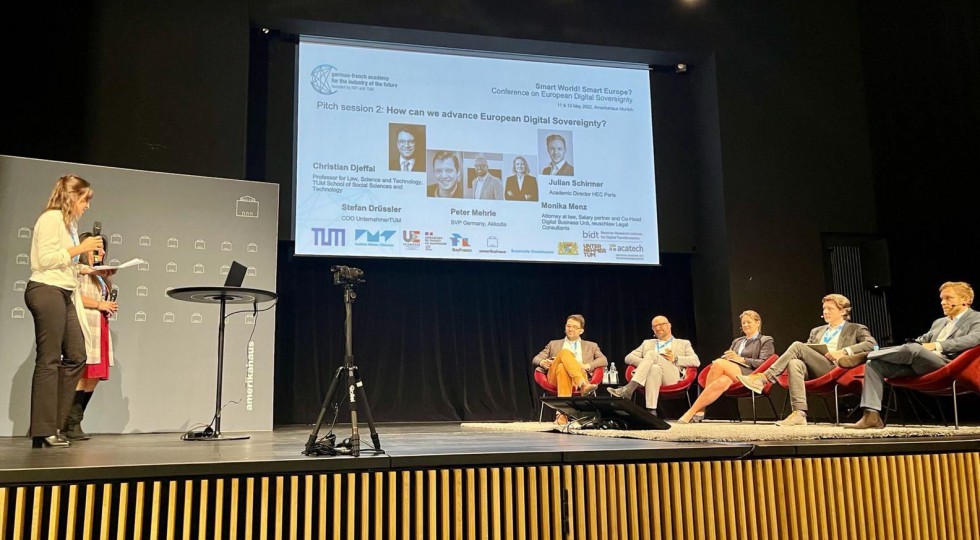
As members of the Chair in Digital Sovereignty, we, Carlota Morais, Nadia Tjahja and Sophie Hoogenboom, submitted an abstract to pitch our ideas on how to achieve digital sovereignty for Europe, and we were selected to participate, with other students and young professionals, in a two-day conference organized by the German-French Academy for the Industry of the Future.
The Conference titled Smart World! Smart Europe? took place in Munich between the 11th and 12th of May 2022 and brought together members of academia, industry, and policymakers, to discuss the development of digital sovereignty in Europe.
Representing UNU-CRIS, we had the opportunity to present to the panelists our ideas on how to strengthen (digital) self-determination and participation in Europe. Self-determination implies that individuals should be able to steer the (digital) fate of the community. To achieve that, a degree of control over technologies is necessary, including verifying their trustworthiness and understanding how to operate them. Open-source technologies have the potential to act as critical tools to achieve these goals by having the source code available for everyone to use, access, develop, and distribute. This contributes to technological transparency, which is critical for individuals to be involved, build trust in technology and understand its inner workings. Furthermore, we highlighted the need to transform the governance structure in which there is systematic access to participation from a skills-based angle to support individuals to contribute to systems and include those who are unable to participate in the system and thus are resorting to creating alternative solutions.
Overall, the pitches followed two main streams of focus – technological leadership and user empowerment – with all groups sharing an understanding of digital sovereignty as a process. Interestingly, most participants in the pitch session supported their ideas not only on goals of competitiveness for European industry but by identifying an axiological substratum – human-centered and based on European values – to sustain calls for European Digital Sovereignty.
Pitches focused on the users' empowerment included the development of new technologies to ensure self-hosting and data sovereignty through the development of new platforms and "identification containers." In addition, other presentations focused on regulatory approaches, devising measures to improve recommended content on online platforms, and ensuring digital self-determination.
Finally, proposals focused on increasing technological leadership underscored how Europe should strive towards "good regulation" in the digital realm and create a more innovation-friendly environment where digital companies can thrive by guaranteeing enterprises access to capital and knowledge.
During both days of the Conference, we had the opportunity to listen to various speakers and panelists that presented a comprehensive overview of the EU policies aimed at building digital sovereignty and political initiatives undertaken by the French and German governments. Speakers from the policymaking sphere in Germany identified as priorities the investment in critical technologies – i.e., AI, Quantum, Robotics, Distributed ledger - the need to attract talent, establish portability and interoperability as a right, promote open standards and open tools, and create a progressive European framework for transnational cooperation. From the French presidency's perspective, the priorities of mastering digital technologies and enforcing European values face challenges related to access to capital by European companies and accelerating the industrialization of start-ups, as well as the need for a comprehensive regulatory agenda to address digital platforms, cybersecurity, and critical infrastructure.
In addition to the digital transition, the industrial panelists also discussed the need to make the green transition work and ensure energy sovereignty for Europe as an enabler of digital sovereignty and strategic autonomy. The transparency of systems and the need to develop new technologies, such as the metaverse, based on European values and a common European identity were also prominent in the industry discussion, with participants making it clear that there is a need to understand digital sovereignty and set objectives accordingly.
From the Academic keynotes, Urs Gasser (Dean of TUM School of Social Sciences and Technology) concluded by positioning the paradigm of digital sovereignty amid the tension between models of cooperation versus competition and control, questioning if sovereignty, as a territoriality-bound frame, is the correct framework to deal with challenges related to technological (inter)dependence. Finally, Professor Jean-Gabriel Ganascia (Head of the ACASA-LIP6 Research Group, Sorbonne University) presented a very interesting overview of the development of sovereignty as a concept and how states are asserting the traditional powers of the sovereign over the digital realm.
We conclude from these two days that the pursuit of digital sovereignty in Europe, although connected with concerns over technological leadership and the global competitiveness of European companies, must be justified by objectives beyond technical advantages. As shown by the participants' pitches, digital sovereignty should represent a change in how individuals are perceived in the digital world – go beyond individuals as consumers and users but as citizens holders of rights - and how their rights – especially privacy, portability of their data, and interoperability - are protected. Moreover, and considering sovereignty as a process and not a state of being, it is essential that a concrete conceptual understanding of digital sovereignty is established so it can be translated into specific ideas and initiatives, and measures to evaluate its success are designed.
If you would like to like to know more about this event or about our presentation, please get in touch with us:
Carlota Morais
Nadia Tjahja
Sophie Hoogenboom

